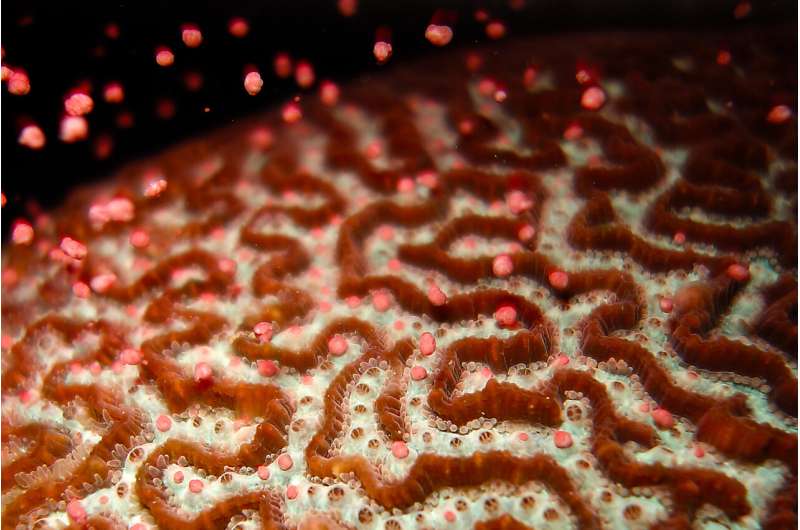Selective breeding can produce heat-tolerant corals

Coral populations have genetic potential to adapt to warming oceans, according to new research by Southern Cross University researchers.
"Our previous work revealed that corals in an extreme environment have an exceptionally high heat tolerance, in part due to genetic adaptation of the coral animal," said Dr. Emily Howells, a Senior Research Fellow at the National Marine Science Centre at Southern Cross University.
"In this study we wanted to test whether we could transfer these beneficial genetic variants to a comparatively heat sensitive coral population living in milder oceanic conditions."
The study, led by Dr. Howells and also involving Southern Cross University lecturer Dr. David Abrego, was an international collaboration between New York University Abu Dhabi, Oregon State University, King Abdullah University of Science and Technology, Zayed University, CSIRO, and the University of Wollongong.
The researchers cross-bred corals from the thermally extreme Persian Gulf with those of the same species from the milder Indian Ocean and measured the performance of many families of their offspring.
The team found that heat tolerance increased by up to 84% when Indian Ocean mothers were bred with Persian Gulf fathers and was, on average, equivalent to the heat tolerance of offspring with both parents from the Persian Gulf.
"This was an impressive result, because while we were expecting to see some enhancement of heat tolerance, the signal was much stronger than we anticipated from the genetic contribution of the fathers alone as maternal effects also contribute to offspring tolerance," Dr. Howells said.
Genome-wide sequencing of the coral families confirmed these findings by revealing that genetic variants positively associated with heat survival were predominantly inherited from Persian Gulf parents.
The researchers also deployed the offspring to the Indian Ocean site and found that cross-bred corals with Persian Gulf fathers survive equally as well as native Indian Ocean purebred corals, but both had higher survival than non-native Persian Gulf purebred corals.
These results demonstrate that corals can be selectively bred for enhanced heat tolerance using corals from populations in extreme or warmer environments which have a higher proportion of heat-tolerant genetic variants due to local adaptation.
"Selective breeding has potential to be used to enhance the resilience of targeted coral populations to climate warming, but requires further testing before it can be implemented in intervention and restoration programs," said Dr. Howells.
"However, the most important actions to enhance the resilience of all coral populations are those that limit the magnitude of climate change."
An unexpected finding of the study was that genetic variation was not restricted to the Persian Gulf and was also present at low levels in the cooler Indian Ocean populations.
"One of the most exciting results of the study was that a small number of Indian Ocean fathers produced offspring with surprisingly high heat tolerance, and these fathers had some of the same genetic variants associated with heat tolerance that were prevalent in the Persian Gulf," said Dr. Howells.
"Such standing genetic variation is essential for natural selection to occur in warming environments."
Co-author Dr. David Abrego said ongoing international collaborations were critical to this work.
"This study has fostered more international collaborations as we investigate if these heat tolerant variants occur in other regions of the Indo-Pacific," said Dr. Abrego.
Dr. Emily Howells' current research investigates standing genetic variation for heat tolerance in Australian coral populations with support from the Hermon Slade Foundation and as part of the Reef Restoration and Adaptation Program, an Australian government partnership to help the Great Barrier Reef resist, adapt and recover from the impacts of climate change.
"Our study, along with other recent research, indicates that some coral populations harbor greater genetic variation for heat tolerance than has previously been realized," said Dr. Howells.
"Now on the Great Barrier Reef we are undertaking in-depth assessments of the physiological and genetic variation that exists within and among breeding populations as well as among them. The goals of this research are to develop diagnostic markers of heat tolerance in corals and to improve understanding of the potential for adaptation to climate change."
More information: Emily J. Howells et al, Enhancing the heat tolerance of reef-building corals to future warming, Science Advances (2021). DOI: 10.1126/sciadv.abg6070
Journal information: Science Advances
Provided by Southern Cross University

















